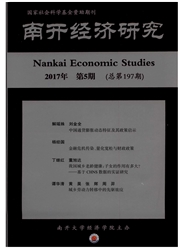

 中文摘要:
中文摘要:
近年来中国一直致力于扩大内需,但内需仍然不足,其原因何在?本文通过扩展戴蒙德世代交叠模型构建了总体内需模型,考察了人口结构变化对内需的影响,并利用1991年-2011年中国省级面板数据进行了实证检验。系统广义矩估计和门槛回归结果表明:少儿抚养比对我国内需具有显著的正向影响,且其正向影响随着经济发达程度的增加而略微减弱;而老年抚养比对我国内需具有显著的负向影响,且其负向影响随着经济发达程度的增加而增强。并发现:适度的人口增长有助于扩大内需,人口城镇化水平与内需呈现正相关关系,而城乡人均收入差距与内需呈现“倒U型”关系,人均收入的提高和地区经济增长对扩大内需均具有积极影响。最终结论表明:我国少儿抚养比的不断下降和老年抚养比的持续上升对内需产生了双重抑制,“少子化”和“老龄化”并存的人口结构新特征是我国内需不足的重要原因之一,全面放开“二孩政策”有助于实现扩大内需的战略目标。
 英文摘要:
英文摘要:
There has been a question that why China's domestic demand is still insufficient, though it has been devoted to expanding domestic demand for years? Based on extended Dia- mond overlapping-generation model, this paper builds overall domestic demand model to inves- tigate the influence of demographic changes on domestic demand and does the empirical test with provincial panel data of China from 1991 to 2011. Estimated results of system GMM and thresh- old regression reveal that child dependency ratio has a significant positive impact on China's do- mestic demand, and this impact slightly weakens with higher levels of economic development. On the other hand, elderly dependency ratio has a significant negative impact on China's domes- tic demand, and this negative impact strengthens with higher levels of economic development. Besides, this paper finds that moderate population growth is beneficial to expand domestic de- mand. Population urbanization positively correlates with domestic demand. Urban-rural income gap has an inverted U-shape relationship with domestic demand. Both level of per capita income and regional economic growth have a positive effect on increasing domestic demand. Final con- clusion shows that both the declining child dependency ratio and increasing elderly dependency ratio are detrimental to domestic demand, and the coexistence of "declining birthrate" and " aging" , which is the new feature of demographic structure, is one of the most important causes for insufficient domestic demand. The opening up of two-child policy will contribute to expand- ing domestic demand.
 同期刊论文项目
同期刊论文项目
 同项目期刊论文
同项目期刊论文
 期刊信息
期刊信息
